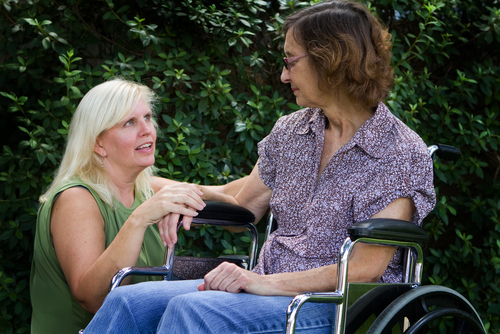
Practice leadership has been identified as being a critical component in ensuring quality disability services. Practice leadership involves the management and support of staff who are at the frontline; staff who support people with learning disability on a daily basis. Typically, practice leaders are the first line supervisors of direct support staff.
Beadle-Brown et al. (2014) believe that active support is part of quality service delivery and that it can enable people with learning disability to engage in meaningful activity and relationships. Beadle-Brown et al., think that active support can be better implemented through effective practice leadership. They recently did a study to find out if a factor in active support was the quality of practice leadership.

Good active support is part of quality services
Methods
The study was conducted over two separate time periods that were four years apart, and information from each of these was compared. The researchers collected data using a range of different measures; questionnaires were used to find out about resident’s skill level, staff experience and satisfaction and practice leadership. The nature and quality of staff support was measured by researchers observing what happened in the services and scoring this on a specially designed measurement tool.
All the data from the first time period were compared with the second time period to see if there had been any change over time. The different parts of data were also compared to find out if there were any significant relationships between them.
Findings
- there was a small increase in active support at the second time period; from 61% to 69%.
- two things affected the change in active support: the quality of management, and practice leadership. Better practice leadership resulted in higher levels of active support.
- overall they found that practice leadership was low.
- some staff said that they had never experienced some of the components of practice leadership in their daily work.
- they found that service users level of ability was also a factor influencing active support.
They concluded that staff need additional skills and assistance to support these individuals, through practice leadership.

Practice leadership leads to better levels of active support
Conclusion & Comment
The findings from Beadle-Brown et al’s study suggest that with improved practice leadership, active support can be better implemented. If there was an improved understanding of what practice leadership was, as well as ensuring all components were in place, then there may have been an even bigger increase in active support. As a way forward, the framework of practice leadership needs to be explained further and made applicable to actual service contexts.
Beadle-Brown, et al outlined the components of practice leadership, but detailed explanation is not included. The following is a more in-depth look at what practice leadership involves:
1. Frontline supervisor/manager should focus all aspects of their work on the resident’s quality of life, and how well staff support this.
To do this, the supervisor must be aware of what the term ‘quality of life’ means. It involves consideration of an individual’s needs and wants in a range of domains such as those outlined by Felce & Perry (1995). It is vital the supervisor and staff team do not impose their own values on the person with disability. It also requires working closely with the individual, their family and friends, to find out what is important to them, and planning how to achieve this.
2. Allocating and organising staff support to residents, based on how and when they want it.
This is much more than just organising rosters. It requires an understanding of the residents support needs and wants, and that these are responded to in a person centred way. Flexibility and creativity is also needed so that resident choice and control is maximised. All support should be resident focused.
3. Coaching staff; spending time with them so that feedback and modelling of practice can occur.
This requires a hands-on approach by the supervisor; practice leadership cannot occur by remote control from the ivory tower. The supervisor must work alongside staff so that they understand how staff support residents. It also provides opportunity for feedback and guidance. The supervisor can also demonstrate and model how support should be delivered.
4. Reviewing the quality of support through 1:1 supervision with staff.
Time needs to be set aside for a meeting between the supervisor and staff members on a regular basis. Here, goals can be established, training needs identified, problems solved, and clear expectations about how support will be delivered can be established.
5. Reviewing how well the team is enabling resident activity and finding ways to improve this through regular staff team meetings.
Regular team meetings enable staff to come together to discuss how they support residents. At team meetings, active support implementation can be reviewed, with ideas shared; successes celebrated, expectations set and plans for the future developed. At meetings, the supervisor can establish a positive staff culture, based on person centred ideals of choice, rights, dignity and respect.
Practice leadership offers a framework for front line supervisors to guide staff in their daily practice, through feedback, observation and guidance. It offers a way forward in managing staff practice, improving outcomes and building positive, respectful staff cultures.
Link
Beadle-Brown, J., Mansell, J., Ashman, B., Ockenden, J., Iles, R., & Whelton, B. (2014). Practice leadership and active support in residential services for people with intellectual disabilities: an exploratory study. Journal of Intellectual Disability Research, 58(9), 838-850 [abstract]
Reference
Felce, D., & Perry, J. (1995). Quality of life: Its definition and measurement. Research in Developmental Disabilities, 16(1), 51-74


RT @LearningDisElf: Achieving increases in active support through practice leadership needs systematic development of skills and mana… ht…
Really interested in this but it says page not found?
Really sorry about technical problem – we will try to sort it out as soon as possible.
meantime, the link to the full post is http://www.thelearningdisabilitieself.net/2014/11/24/achieving-increases-in-active-support-through-practice-leadership-needs-systematic-development-of-skills-and-management-focus-says-exploratory-study/
Let us know if this still does not open. Once again, many apologies
john
Practice leadership has been identified as being a critical component in ensuring quality disability services – http://t.co/TawTUF7boZ
Charmaine Wright liked this on Facebook.
Jonathan Beebee liked this on Facebook.
Increasing active support through practice leadership needs systematic skill development & management http://t.co/tKD5PiLsbh via @sharethis
sorry about the technical hitch – try this link http://www.thelearningdisabilitieself.net/2014/11/24/achieving-increases-in-active-support-through-practice-leadership-needs-systematic-development-of-skills-and-management-focus-says-exploratory-study/
Active support in LD services and practice leadership – what’s the connection? Louise Phillips’ blog explains http://t.co/AqLcgqzQLi
Achieving increases in active support through practice leadership needs… http://t.co/K5lxVOUBib via @LearningDisElf http://t.co/8Bv8FfYJul
Don’t miss our blog on how to achieve increases in active support through practice leadership http://t.co/AqLcgqzQLi
#ActiveSupport in #LD services: http://t.co/lUvW7fSK1f